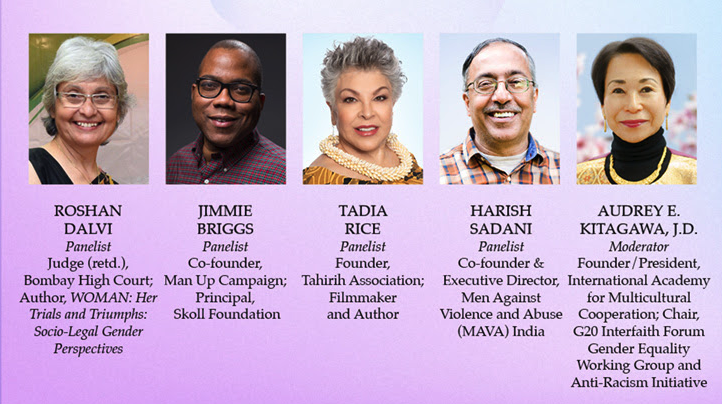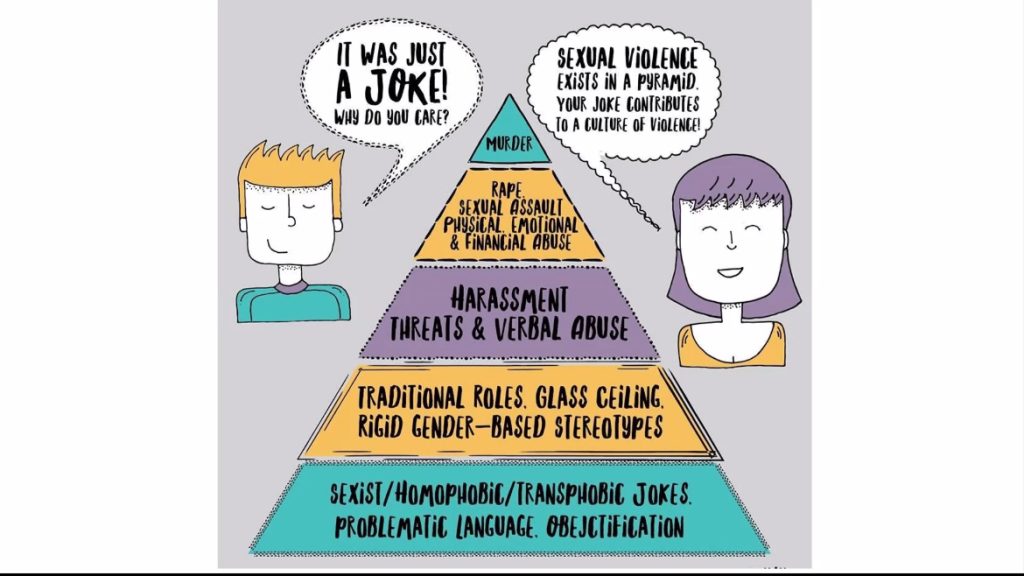By JoAnne Wadsworth, Communications Consultant, G20 Interfaith Forum
– – –
On March 21, 2024, the G20 Interfaith Forum’s Anti Racism Initiative and Gender Equality Working Group co-hosted an expert discussion of gender perspectives and awareness entitled “What is Gender Equality?”
Speakers included Roshan Dalvi, retired judge for the Bombay High Court and author of “WOMAN: Her Trials and Triumphs: Socio-Legal Gender Perspectives”; Tadia Rice, Founder of the Tahirih Association, Filmmaker, and Author; and Harish Sadani, Co-founder and Executive Director of Men Against Violence and Abuse (MAVA) India. Audrey Kitagawa, Founder/President of the International Academy for Multicultural Cooperation and Chair of the IF20 Anti-Racism Initiative and Gender Equality Working Group, moderated the discussion.

Audrey Kitagawa began the discussion by welcoming all attendees and panelists, and briefly introducing the two IF20 groups co-hosting the webinar. She then provided a brief overview of the issue at hand and its scope, citing that one in three women around the world has experienced physical or sexual violence—and that though Gender Equality has been part of international human rights frameworks since 1948, current progress toward Goal 5 of the Sustainable Development Goals (SDGs) is too slow to avoid leaving millions of women and girls in abject poverty by 2030.
She said that there have been good changes in various initiatives and legal instruments upholding the equal rights of women, but that the shared principle of “gender equality” in various countries and religious traditions around the world is interpreted and practiced in very different ways, using very different perspectives. Thus, the aim of the webinar is to ask the fundamental question: “What is Gender Equality?”
Kitagawa then introduced each of the speakers and invited them to share their prepared comments.
Roshan Dalvi
Dalvi’s comments focused on Gender Equality from two perspectives: The triumphs of women, and the trials of women.
“There are women who have achieved a lot – we here have gender equality in our workplaces and homes. However, though thousands of women have these triumphs, millions of women still have dramatic trials instead.”
She gave examples of both triumphs (women presidents leading countries better through COVID, majority women parliaments in Rwanda, women in the armed forces) and trials (equal pay, gender violence, early marriage, financial status, and more). Then she asserted that we need not just gender equality, but gender equity: Not just allowing women into these spaces, but materialized power balances that account for disadvantages and give women a helping hand. For example, though women are allowed and often welcomed into the workplace, many buildings have fewer (or less convenient) bathrooms for women, and office temperatures, desk chairs, etc. are calibrated for men.
“We need qualitative equality, not just quantitative. When women thrive, all of society benefits, and succeeding generations get a better start in life.”
Tadia Rice
Rice drew on her Baha’i faith to paint a wider picture of what gender equal societies might look like, and what role institutions might play in creating an enabling environment to empower girls to succeed.
She said that Baha’i teachings have long supported the idea that women and girls should participate in the affairs of the world—and that when they enter confidently into law and politics, wars will cease. The essential enabling environment that must be created to empower girls starts in the home and the family.
“Girls are the most powerful and first influences in building children and communities. If the family empowers sons and daughters equally, then children are taught true unity, solidarity, and respect. That’s the foundation from which we need to operate.”

Another essential part of that foundation, Rice said, is girls receiving an equal education as the only opportunity to progress, foster ability and capacity, grow, and function at a high level in society.
“We should advocate that girls should be given first priority for education when there are limited resources, not boys—because they are the mothers and they will teach their children as the first educators of the next generation.”
She said that men also need to be strong in this education of women’s equality, and compared efforts toward gender equality (and the success of society at large) to a bird with two wings. Men are one of the bird’s two wings, and their understanding cannot remain weak if the bird is going to be able to fly. As long as current impressions of women remain tolerated, men will continue to harbor these old habits in their home lives, work lives, and international relations. These erroneous beliefs about girls and their roles need to change. Men need to be sensitized on how they unknowingly discourage girls and block their progress.
Media, with its extremely powerful influence over common perceptions through portrayals and emphases on certain social values, along with religions and governments, all share a special responsibility to support this effort and work together in it.
“If one wing remains weak, flight is impossible. Until the world of women is equal to the world of men, society will never achieve true happiness and peace.”
Harish Sadani
Sadani focused his comments on patriarchal mindsets and current perceptions of gender, and the need to reeducate men and boys in order to overcome embedded stereotypes and damaging attitudes. He explained that if gender (the ideals, roles, and norms that are associated with being a man or a woman) is a social construct, then masculinity and femininity, too, are social constructs. Looking at social inequalities from a gender perspective, the murders, rapes, and examples of gender-based violence that so many talk about are just the tip of a large and deeply embedded iceberg of societal norms.

“Harassment, traditional roles, gender stereotypes, glass ceilings, sexist jokes, problematic language, and objectification all exist beneath gender-based violence, leading to it and supporting it. There are a ton of societal norms that are creating that—and this existing construct needs to be challenged and interrogated. It has to be done by men, since women have already been doing it for years.”
Sadani said that not men, but the patriarchal mindset, are the enemy, and that true feminism sees men as allies to achieving balance. He presented four points looking at men’s relationship with and role in the battle for gender equality:
- If men are part of the problem, they should be part of the solution. Just empowering women is not sufficient—men must be engaged to help instead of hinder.
- To achieve balance of power between men and women, men must cede power. This will not happen unless we work with men.
- While many men are perpetrators of aggression, violence, and discrimination, there are also men who are not. These men can be allies.
- Men also suffocate in mold of patriarchy. They need liberation, too, from societal shackles.
He then explained how his organization, MAVA India, was founded, and how it creates a space for boys and men to learn, un-learn, and self reflect using out of the box methods, film, theater, social media, and more. Through MAVA, Sadani has been able to intensely mentor more than 1000 men and boys, and these have reached out to their peers, making a difference in their communities.
The healthy conversations that MAVA encourages in these safe spaces include the topics of consent and dissent, looking into the meaning of sexual harassment, standing up for the rights of women on safety and dignity, taking simple steps to be an upstander rather than a bystander, and saying no to degrading comments, sexist jokes, daily misogyny and casual sexism.
Q&A Session
The floor was then opened up to questions from the audience, which were plentiful. Roshan Dalvi clarified the difference between gender equality and gender equity, citing more examples of women’s triumphs and trials:
“Gender equality is inclusion and diversity. If there is any place where boys are allowed but girls are not, there is no equality. When you have gender equality, you have diversity and less disparity. But affirmative action and giving girls a truly level playing field—that is equity.”
Tadia Rice addressed several questions about those identifying as “other” or third gender, and drawing on traditional Polynesian cultural values to teach the concept of gender parity in societies.
Harish Sadani addressed MAVA allies and equivalents in the US, and the importance of including the concept of gender as a spectrum and transgender people in our awareness-building efforts and conversations.
Conclusion
In conclusion, Kitagawa invited each of the panelists to offer a few short final remarks for the audience to take away from the conversation.
Roshan Dalvi: “We have to begin from the very beginning: From our homes, where boys and girls are treated equally, from our schools, where girls are given a helping hand, etc. Once we aim at those youngsters, we’ll change an entire generation. Teach the boy child and you will automatically save the girl child.”
Tadia Rice: “What is fundamentally required to advance our civilizations is three things: A shift in political will, eliminating patriarchy in every aspect of the human condition, and the spiritual recognition that all humans are inherently equal to one another.”
Harish Sadani: “The first documented discrimination in mankind is gender inequality, but each of us can do our bit to address this issue. And the first step is healthy conversations. If constructs of masculinity are at the root of the problem, masculinity must first be deconstructed and then reconstructed. Men can be allies, can be partners, can be stakeholders in this gender-just world that we’re aiming for. And we should teach this through more youth-friendly mediums that enable people to think for themselves and evolve.”
Kitagawa concluded by expressing her appreciation for the panelists and thanking all the audience members for joining, encouraging all to stay tuned for more discussions in the future.
– – –
JoAnne Wadsworth is a Communications Consultant for the G20 Interfaith Association and acting editor of the “Viewpoints” blog.


